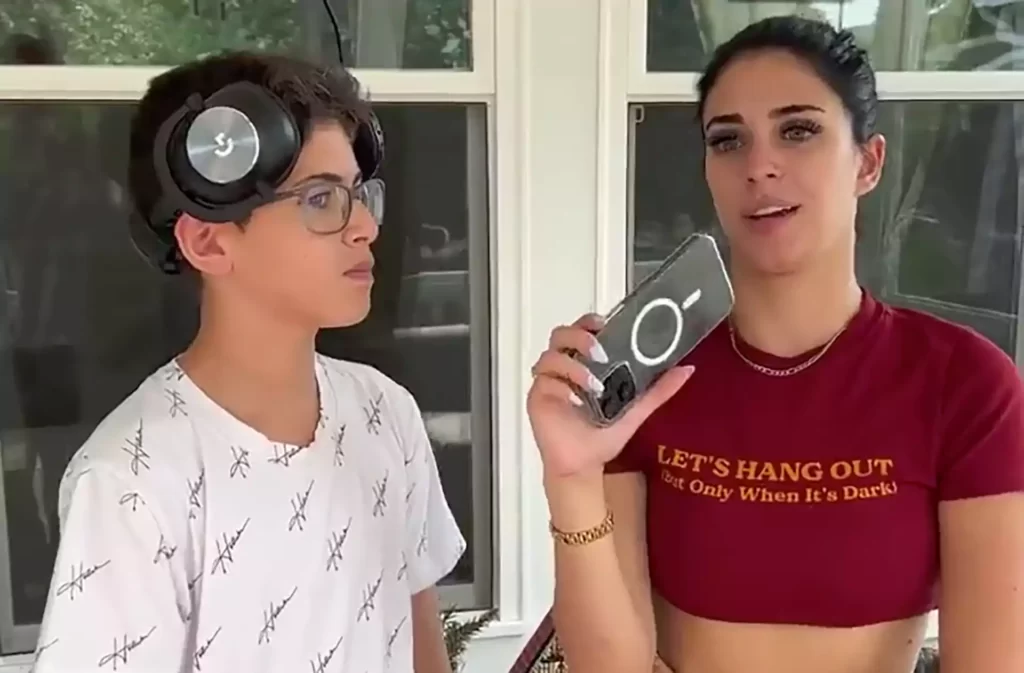Camilla Araujo OnlyFans Leak: What You Need To Know
Is the digital age a double-edged sword for creators, offering unprecedented reach while simultaneously exposing them to vulnerabilities? The unauthorized dissemination of content, often referred to as leaks, casts a long shadow, raising critical questions about privacy, consent, and the ethical responsibilities of platforms and users alike.
The story of Camilla Araujo, a name that has recently become synonymous with the complexities of online content creation, serves as a stark example. The controversy surrounding her OnlyFans content has ignited a widespread discussion, forcing a reckoning with the potential for harm in a hyper-connected world. This case, far from being an isolated incident, represents a broader trend, underscoring the urgent need for a deeper understanding of the legal, ethical, and technical dimensions of online privacy. From the initial launch of her OnlyFans account to the subsequent spread of leaked material across various social media platforms, the narrative unfolds as a cautionary tale.
| Category | Details |
|---|---|
| Full Name | Camilla Araujo |
| Profession | Social Media Influencer, Model, Content Creator |
| Known For | Her presence on Instagram, YouTube, and OnlyFans; Controversy surrounding leaked content |
| Online Platforms | Instagram, YouTube, OnlyFans |
| Controversy | Alleged leak of her OnlyFans content |
| Date of Birth | Not publicly available |
| Age | Not publicly available |
| Nationality | Brazilian |
| Marital Status | Not publicly available |
| Height | Not publicly available |
| Weight | Not publicly available |
| Net Worth | Not publicly available |
| Reference | Google Search (Due to the nature of the content and privacy concerns, direct links to detailed biographical information are often limited. Using a search engine is a common way to find news and information.) |
In late 2022, the digital landscape shifted dramatically for Camilla Araujo. Private content, allegedly originating from her OnlyFans account, began circulating online without her consent. This incident, while not unique in the realm of online content, garnered significant attention due to Araujo's rising profile and the sensitive nature of the material involved. The unauthorized sharing of these photos and videos, described by many as a "leak," ignited a firestorm of debate, highlighting the pervasive risks content creators face in the digital sphere. The unauthorized access and distribution of Araujos private content on platforms like Reddit, Twitter, and other adult sites exposed vulnerabilities inherent in digital content storage and dissemination.
The immediate aftermath of the leak saw a surge of commentary and reactions across the internet. Many expressed outrage, condemning the violation of Araujo's privacy and the unethical nature of the distribution. Others focused on the technical aspects, examining how the content was obtained and shared. There were also discussions regarding the role of OnlyFans and other platforms in preventing such incidents, with calls for stronger security measures and more robust content moderation policies. The dissemination of the content was swift and widespread, highlighting the ease with which private information can be compromised and distributed in the digital age.
The incident also served as a catalyst for broader discussions about the ethics of online content creation and consumption. The case brought to the forefront complex questions about consent, agency, and the responsibility of individuals who share or view leaked content. Many argue that the leak directly undermines a creator's control over their own work and their ability to manage their public image. The debate also encompassed the role of platforms, such as OnlyFans, in safeguarding the privacy of creators and enforcing their terms of service.
The impact of the leak extended beyond the immediate online sphere, potentially affecting Araujos career and personal life. The unauthorized sharing of her content has been reported to cause significant distress and damage to her reputation, with some fearing long-term repercussions. The repercussions for the involved parties, including those who shared or accessed the leaked content, remains a complex issue. The legal and ethical consequences of unauthorized content distribution are still being debated, further complicating the matter.
Camilla Araujo's experience, however, is not an isolated incident. The leak of her content is part of a larger pattern of online privacy breaches affecting content creators across various platforms. As digital technology continues to evolve, so too do the methods used to access and share private information. These methods include phishing, hacking, and social engineering techniques. The frequency and sophistication of these attacks emphasize the importance of digital security. There is a pressing need for comprehensive strategies to protect personal information and digital assets. The ongoing proliferation of leaks underscores the need for enhanced digital security practices, and it raises the importance of individual responsibility in the online environment.
The rise of platforms like OnlyFans, where creators can directly monetize their content, has created new avenues for economic empowerment. Yet, it has also opened up new vulnerabilities. The business model of these platforms, combined with the nature of the content shared, can create tempting targets for malicious actors. These actors often seek to exploit both the creators and their audiences. Many argue that creators should have more control over their content, and more resources should be directed to protect their privacy and security. The incident involving Camilla Araujo has highlighted these challenges, demonstrating the need for robust measures to protect creators from exploitation and unauthorized content sharing.
The unauthorized distribution of content often unfolds in distinct phases. It typically begins with unauthorized access to private material, which may involve hacking a personal device or account. This is followed by the dissemination of the material across various online platforms, including social media, file-sharing sites, and dark web forums. The final stage involves the widespread consumption of the leaked content, often accompanied by commentary and discussion. Understanding these stages is vital for developing effective prevention strategies. Each phase presents opportunities for intervention, from strengthening digital security to raising awareness about responsible online behavior.
The incident involving Camilla Araujo has sparked a new focus on digital security measures. This includes using strong passwords, enabling two-factor authentication, and being wary of phishing scams. These measures are essential to protect personal information and prevent unauthorized access to accounts and devices. There is also a growing need for increased platform accountability, urging online platforms to improve their security infrastructure and content moderation policies. Platforms must work to identify and remove leaked content swiftly, while also taking proactive steps to prevent future breaches. It is a constant battle, requiring constant vigilance and a commitment to continuous improvement.
The broader conversation surrounding the leak extends to ethical considerations, with many people discussing the impact of the leak on Araujo's mental health and emotional well-being. These discussions have focused on the trauma caused by privacy violations and the importance of providing support to those affected by such incidents. Some people are calling for a more empathetic approach to online content, while others are advocating for a greater emphasis on consent and respect. The human cost of online content leaks is a critical aspect of the narrative and one that should not be overlooked. The discussions highlighted the importance of compassion and empathy in the face of these events.
The legal and ethical frameworks surrounding online content and privacy are continuously evolving. The laws and regulations governing data protection and intellectual property vary significantly across jurisdictions. Navigating this complex landscape requires awareness of the relevant legal frameworks and the rights and responsibilities of both creators and consumers of content. The discussions involve important questions about who is responsible when private content is leaked. Many people think this is an important topic, which has led to a deeper examination of the legal implications.
In the wake of the leak, the adult entertainment industry has been forced to respond. The industry has a complex relationship with privacy and content security. Some advocate for increased security measures and content moderation. Other people are calling for transparency and ethical practices. The incident involving Camilla Araujo has brought these issues to the forefront. Discussions on topics like responsible content distribution and the protection of creators rights are underway.
Camilla Araujos story is a vivid reminder of the risks inherent in the digital age. As the internet becomes increasingly intertwined with our lives, the need for robust privacy and security measures has never been greater. The unauthorized sharing of content is not merely a technical issue. It is a reflection of the values and principles that govern our online interactions. The incident calls for a collective effort to foster a more responsible and ethical digital environment.
The case has also sparked conversations about the long-term implications for content creators. The impact of the leak on Araujo's career serves as a warning of the unpredictable nature of online fame. The incident highlights the need for creators to develop comprehensive strategies for protecting their work. This may involve diversifying content creation, establishing strong legal protections, and building a strong community around their brand. The challenges and opportunities facing content creators in the digital age require a multifaceted approach. Creators need to be aware of the risks. It is essential that they equip themselves with the knowledge and tools necessary to navigate the complex online environment successfully.
The debate around Araujos OnlyFans content, for all its controversies, has also prompted reflection on the evolving nature of consent in the digital realm. Discussions surrounding consent and boundaries in content creation are more critical than ever. These discussions revolve around the need to clearly define consent. Some people think that it is extremely important that all parties involved understand the terms of content sharing. The evolving definition of consent and the importance of respecting creators agency are essential to prevent future incidents.
The online response to the situation surrounding Camilla Araujo has been varied. Some fans and commentators have expressed solidarity with the influencer. Many have condemned the actions of those involved in the leak. There are calls for greater respect for creators' privacy and for an end to the unauthorized sharing of content. The incident has served as a reminder of the importance of empathy. Many people are taking the time to consider the human impact of these events.
The incident highlights the importance of digital literacy. Individuals must understand the potential risks of sharing personal information online. Digital literacy helps in adopting safe online practices. This can help in making responsible decisions. There is a need for ongoing education about digital security. The ongoing education will help in promoting responsible online behavior.
The events surrounding Camilla Araujo and her leaked content serve as a critical case study, urging a comprehensive approach that includes enhanced security protocols, ethical considerations, and ongoing discussions about privacy. This incident provides valuable lessons for both creators and consumers in the digital age. The digital world has changed, and a shift in perspective is required to meet its challenges.
The case surrounding Camilla Araujo underscores the urgency with which we must address the ongoing challenges of privacy and content protection in the digital realm. The narrative highlights the potential for harm. It also emphasizes the need for a more responsible and ethical approach to online content creation and consumption. The incident stands as a reminder that even in the virtual world, real-world consequences exist. The ongoing conversation is not just about protecting individual creators. Its about building a more secure and respectful online ecosystem. The future of online privacy and security depends on collective action and a shared commitment to digital responsibility.


